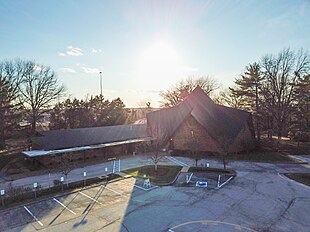Temple Emanuel (Creve Coeur, Missouri)
| Temple Emanuel | |
|---|---|
 Temple Emanuel in 2018 | |
| Religion | |
| Affiliation | Reform Judaism |
| Ecclesiastical or organisational status | Synagogue |
| Leadership |
|
| Status | Active |
| Location | |
| Location | 12166 Conway Road, Creve Coeur, Missouri |
| Country | United States |
Location in Missouri | |
| Geographic coordinates | 38°38′29″N 90°26′51″W / 38.6414°N 90.4474°W |
| Architecture | |
| Architect(s) | William Bernoudy |
| Type | Synagogue |
| Style | Modernist |
| Date established | 1956 (as a congregation) |
| Groundbreaking | 1961 |
| Completed | 1962 |
| Materials | Roof: Laminated wood beams, decking, copper |
| Website | |
| testl | |
| [1] | |
Temple Emanuel is a Reform Jewish synagogue located at 12166 Conway Road, near the corner of New Ballas Road, in Creve Coeur, Missouri, in the United States.[2][3] Organized in 1956, it is affiliated with the Union for Reform Judaism (UAHC). It has a membership of 300 families.
The Temple is notable not only for its size, but for its unique Modernist architecture.
History[edit]
A group of parents in the area first had the idea to form a synagogue in the 1940s as a way to further their children's religious education.[4][5] They founded St. Louis School for Judaism in September 1953 and organized the synagogue in 1956, choosing the name "Temple Emanuel" on December 16, 1956.[6][7][4][5] It was the first Reform congregation founded in St. Louis in 70 years.[5] The congregation initially had 48 families, and services were held at the Bible Presbyterian Church.[4] Construction at the Conway Road site began in September 1961, and the completed building was dedicated in January 1963.[4] The synagogue is affiliated with [the Union for Reform Judaism, which was formerly called] the UAHC.[8]
In March 2008, the synagogue and Temple Israel in Creve Coeur (which had approximately 1,000 families) announced a plan to merge, which would have created a congregation of 1,400 families, one of the area's largest Reform Jewish congregations.[9][10] After two months of discussions among some leaders of the synagogues, the matter became public when the two Boards of Directors were asked for their input.[9] The membership of Temple Emanuel were given presentations on possible merger in April.[11] The school enrollment had declined from 137 students in 2001 to 79 students in 2008.[11] Ultimately, after 2/3 of congregants indicated that they preferred independence in balloting the following month, the congregation decided overwhelmingly to remain independent.[12][13]
In 2010, Temple Emanuel mounted an exhibition of black and white photographs of Albanian Muslims who rescued 2,000 Jews during the Holocaust.[14][15] Its rabbi said a goal of the congregation with the exhibit was "to tell people ... these are examples of Muslim-Jewish respect, tolerance and love."[16]
Services, classes, and programs[edit]
The synagogue provides Shabbat and Sunday religious services.[17] Temple Emanuel instituted its Sunday services in 1958, decades after the Sunday-Sabbath movement in American Reform Judaism had largely ended.[18]
It also provides Sunday religious school and Hebrew in preparation for Bar/Bat Mitzvah, as well as Torah study and adult learning courses. In addition, it provides programs on interfaith issues and family learning, as well as youth and senior programs.[17]
Membership, clergy, and leadership[edit]
As of 2016, the synagogue had a membership of about 250 families.[17]
Temple Emanuel's Senior Rabbi is Elizabeth Hersh. Its Rabbi Emeritus and Senior Scholar is Dr. Joseph R. Rosenbloom, who has been rabbi at the synagogue for more than 42 years.[17][19] Since 1977, the temple's "Cantorial Soloist" has been Malachi Owens, a non-Jewish African American who worked as an electrical engineer and has also been a Baptist minister since 1998.[20][21][22]
Design[edit]

Its 1962 building in the St. Louis suburb of Creve Coeur, Missouri, was designed by architect William Bernoudy, of the firm Bernoudy-Mutrux-Bauer, which was known for its originality.[23][24][25][26] It was designed in the shape of the six-pointed Jewish star.[27][28][29] The congregation owns the building, and the land on which it sits.[12]
The St. Louis County Historic Buildings Commission has named the synagogue an outstanding example of mid-century Modern architecture worthy of preservation.[23]
References[edit]
- ^ "Lay leadership". Temple Israel.[self-published source?]
- ^ Betsy Sheldon (2001). The Jewish travel guide. Hunter Publishing, Inc. ISBN 9781556508790. Retrieved June 24, 2011.
- ^ George McCue (1967). The building art in St. Louis: two centuries: a guide to the architecture of the city and its environs. St. Louis Chapter, American Institute of Architects. Retrieved June 24, 2011.
- ^ a b c d "Temple Emanuel Congregation". History Happened Here. Missouri Historical Society. Retrieved June 26, 2011.
- ^ a b c Kassander, Jill (September 19, 2006). "Temple celebrates half century mark". St. Louis Jewish Light. Retrieved June 27, 2011.
- ^ Central Conference of American Rabbis (1980). Journal of Reform Judaism. Retrieved June 24, 2011.
- ^ CCAR journal. 1950. Retrieved June 24, 2011.
- ^ Oded Rosen (1983). The Encyclopedia of Jewish institutions: United States & Canada. Mosadot Publications. ISBN 9780913185001. Retrieved June 24, 2011.
- ^ a b Hathaway, Matthew (March 6, 2008). "Two Reform Jewish congregations may merge". St. Louis Post-Dispatch. Retrieved June 27, 2011.
- ^ Sherwin, Mike (March 12, 2008). "Temples to consider merger". St. Louis Jewish Light. Retrieved June 27, 2011.
- ^ a b Kassander, Jill (May 1, 2008). "Temple Emanuel discusses options for future". St. Louis Jewish Light. Retrieved June 27, 2011.
- ^ a b Kassander, Jill (February 11, 2009). "Temple Emanuel looks to its future". St. Louis Jewish Light. Retrieved June 27, 2011.
- ^ Kassander, Jill (May 7, 2008). "Vote favors stand alone option at T.E." St. Louis Jewish Light. Retrieved June 27, 2011.
- ^ Proud, Kelsey (December 17, 2010). "Temple Emanuel photography exhibit highlights Albania, living with "besa" or "word of honor"". St. Louis Public Radio. Retrieved June 26, 2011.
- ^ "Temple Emanuel to Host Holocaust Photo Exhibit Of Albanian Muslims Who Saved Jews". Jewish in St. Louis. September 14, 2010. Retrieved June 26, 2011.
- ^ Baugher, David (October 13, 2010). "Photo exhibit focuses on Muslims who saved Jews during WWII". St. Louis Jewish Light. Retrieved June 27, 2011.
- ^ a b c d "Temple Emanuel". St. Louis Jewish Light. Retrieved June 27, 2011.
- ^ Olitzky, Kerry M. (1982). The Sunday-Sabbath Movement in American Reform Judaism: Strategy or Evolution? (PDF). American Jewish Archives. Retrieved June 26, 2011.
- ^ Joseph R. Rosenbloom (2006). Secret Bible: A Secular Approach. Sts. Jude imPress. ISBN 9780976659952. Retrieved June 24, 2011.
- ^ "Malachi Owens, Cantorial Soloist" at Temple Emanuel website (accessed June 29, 2011).
- ^ "Dual life: Baptist minister also serves as Jewish cantor", KSDK, October 13, 2009.
- ^ "The Electrical Engineer That Could", Washington University in St. Louis Magazine, Fall 2005.
- ^ a b St. Louis County Historic Buildings Commission (June 3, 2007). Mid-Century Modern Architecture in St. Louis County; Outstanding Examples Worthy of Preservation (PDF). Retrieved June 27, 2011.
- ^ Architecture: the AIA journal. June 16, 2010. Retrieved June 27, 2011.
- ^ Gateway heritage: quarterly journal of the Missouri Historical Society, Volumes 21–22. Missouri Historical Society. 2000. Retrieved June 27, 2011.
- ^ "Retelling of Temple Emanuel Story Starts with Bernoudy-Mutrux-Bauer". St. Louis Post-Dispatch. October 13, 2002. Retrieved June 27, 2011.
- ^ William Adair Bernoudy, Architect: Bringing the Legacy of Frank Lloyd Wright to St. Louis, Osmund Overby (University of Missouri Press)
- ^ "Temple Emanuel looks to its future," Jill Kassander, St Louis Jewish Light, February 11, 2009, retrieved June 23, 2011.
- ^ Modern Architecture in St. Louis: Washington University and Postwar American Architecture, 1948–1973, Eric Mumford, Washington University Press, 2004.
External links[edit]
- Official website
- Dedication Temple Emanual: 5723 (January 1963), Temple Emanuel (St. Louis, Missouri), Temple Emanual, 1963
- The building art in St. Louis, by George McCue, published by the St. Louis Chapter, American Institute of Architects, 1967

